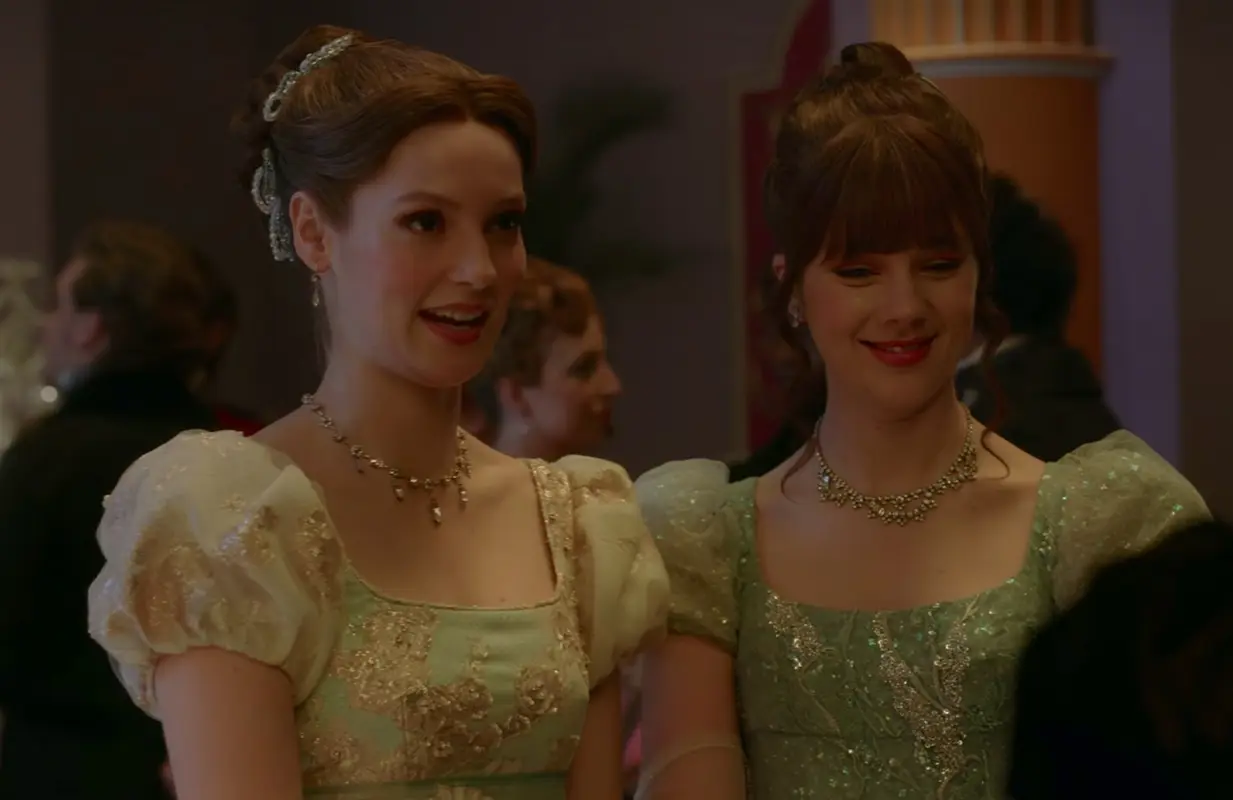Bridgerton's Queer Storylines Make Its Future Even More Promising
-
 Hannah Dodd and Claudia Jessie (Screenshot: Bridgerton)
Hannah Dodd and Claudia Jessie (Screenshot: Bridgerton)Gather ’round, Lady Whistledown readers — another chapter of Bridgerton has come to a close. The third season of Netflix’s hit historical romance series, based on the books by Julia Quinn, centers on the charming friends-to-lovers relationship between Penelope Featherington (Nicola Coughlan) and Colin Bridgerton (Luke Newton).
Part 2, which premiered on June 13, offers a satisfying conclusion for Polin fans, plenty of heartwarming moments for the romantic in all of us, and even more steamy scenes (like that much-anticipated mirror moment). There’s undoubtedly a lot to like about the final two episodes of the season — however, the most intriguing and exciting aspect is the unexpected, but most welcome, queer representation.
As an escapist drama first and foremost, Bridgerton has always adopted a color-blind approach when it comes to race in the Regency Era. The decision has garnered both praise and criticism; in particular, it’s sparked debate about colorism. Up until now, however, the show’s “alternative history” lens hasn’t applied to LGBTQ+ stories.
The only queer character in the first two seasons appears to be Henry Granville (Julian Ovenden), who has a secret romance with a minor character, Lord Wetherby (Ned Porteous). While that’s better than nothing, it hardly qualifies as groundbreaking representation. Sure, Henry is there, but he and his relationship aren’t exactly at the forefront of the story.
Season 3 of Bridgerton changes this by introducing not one, but two major queer storylines. Benedict Bridgerton (Luke Thompson), whom fans have long speculated might be queer in light of his obvious chemistry with Henry, begins a romance with Tilley Arnold (Hannah New) and engages in threesomes with her and her friend, Paul. This clearly isn’t something Benedict does just for Tilley’s pleasure; he equally enjoys being intimate with Paul, declaring that he has “love to give in abundance.” In an interview with Bustle, Thompson describes his character’s identity as “something along the lines of pansexuality.”
Benedict’s on-screen exploration of his sexuality is made even more meaningful with powerful words of encouragement from Tilley. “There is so much in society that is unnatural,” she tells him. “But a feeling between two people, whatever their sex, is the most natural thing in the world.” Basically, in Regency terms, she’s pumping her fists and chanting, “Gay rights!”
On top of Benedict’s arc, the finale throws in a delightfully unexpected twist for Francesca Bridgerton (Hannah Dodd). She’s just married Lord John Stirling (Victor Alli) and the two are about to embark on an adventure to Scotland when he introduces her to his cousin, Michaela (Masali Baduza). It’s immediately obvious that Francesca is beyond smitten with her (we’re talking about L-O-V-E!); she might as well pass out on the spot.
In the books, John’s cousin is a man named Michael. The gender swap is a welcome surprise — not only does it expand the show’s queer representation, it also adds depth to Francesca’s character in a way that feels organic. “As a queer woman, I really identified with [Francesca]. Her book talks a lot about how she’s different and doesn’t know why,” showrunner Jess Brownell recently told The Wrap. “I think for many queer people, that sense of feeling different and like an outsider is something we carry with us from the time [we] were young.”
Benedict and Francesca’s storylines open up a lot of exciting new possibilities, and it will certainly be interesting to see how their characters evolve from here. This also raises the question as to how Bridgerton will approach queerness — will it be handled similarly to race in “alternative history” fashion, or will the characters have to deal with homophobia?
“There is evidence in Season 1 that gay men, to a degree, had to be closeted,” Brownell said in an interview with Variety. “But I think it is very possible that The Great Experiment [the show’s colorblind approach] could be pushed further in the future of the show. And I have a lot of ideas about how to approach that.”
So far, it remains under wraps which main couple Season 4 will revolve around, but Brownell confirmed to Variety that the upcoming season, which is currently being written, won’t combine multiple books. Even if this next season doesn’t center around Francesca and Michaela or Benedict, just the possibility that Bridgerton could soon have a queer relationship front and center is incredibly exciting. Plus, from the looks of Francesca and Michaela’s first meeting, we have a feeling there will be some serious chemistry between the two of them — perhaps they’ll even outdo Polin’s carriage moment.
Bridgerton Season 3 is now streaming in its entirety on Netflix. Join the discussion about the show in our forums.
Kelly Martinez is a TV Reporter based in Los Angeles. Her previous work can be found at BuzzFeed and People Magazine, among other outlets. She enjoys reading, spending time with her cat, and explaining the plot of Riverdale to people.
TOPICS: Bridgerton, Netflix
- 12 days of Bridgerton: All about the special releases scheduled ahead of the release of Bridgerton season 4
- Bridgerton star Luke Newton goes Instagram official with girlfriend Antonia Roumelioti
- Bridgerton's Poignant Mirror Scene Is Everything Fans Could Want
- Bridgerton's Francesca Is the Most Intriguing Part of Season 3 So Far